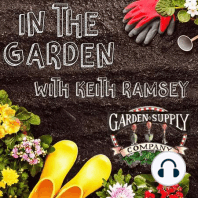10 min listen
Winter Garden Checklist
FromIn The Garden
ratings:
Length:
9 minutes
Released:
Feb 8, 2022
Format:
Podcast episode
Description
Keith: [00:00:00] Hey, Keith Ramsey with garden supply company. People are always asking what to do in the wintertime in the garden. And there's, there's a long list of, to do's in the winter. Not many people want to go out because we've got such cold weather. One of my favorite things to do while it's cool is spreading mulch.It requires a minor cleanup picking up sticks and debris, raking the beds out, and getting everything ready for spring. You usually want to cut your perennial plants that need cleaning up or pruning. And there's lots of pruning.That can be done during the wintertime, so once you get through some of those projects, we'll touch back on pruning further down, but Once you get all the beds cleaned out. Mulching is a hot process. The mulch itself [00:01:00] creates a lot of heat, and when it's cool out, it's a nice thing to you'll go out with a heavy coat.And, as soon as you get into that mulch pile, you'll be shedding layers. And so it's something I like to do, it's probably not a bad thing this time of year because I don't know about everybody else, but I had way too many calories over Christmas. And that's a calorie-burning project for sure.Get you out, do something good for your heart, and burn calories. Mulch also holds moisture in the ground, and it contains a lot of heat in the ground. So it's good for plant roots. We say our plants repeatedly, but winter, fall, winter, and early spring is the time to plant.You can plant 12 months out of the year. There's no, no better time than when the plants are dormant. But you get a plant in the ground, and it's in the middle of winter, and you put mulch on it. The reason it places this stuff in the ground in the wintertime is so good is that we've got the plants will [00:02:00] grow roots all through the winter.And, but when you mulch it, you're adding heat to the heat, to the ground. You're going to grow a lot more roots, a lot faster. It knocks the edge off of the cold for the plants. So it's an excellent thing for the plant in the wintertime and then suitable for weed control. You're getting ahead of the head of the schedule your molten and things that you might get to germinate that are on the surface.And then the cold weather is going to kill them out. When I'm cleaning up prepping for mulch, a lot of the debris that we have, I've got a fire pit, so I'm picking up sticks and stuff like that. I drop them in the fire pit, and I'm prepping myself. I'll break them up and build a fire at the same time.And it's an excellent way to get rid of that kind of stuff if all, and, or take it, taking it out to the street. But sometimes, when we're working in the yard, depending on the time of the year, if it's cool, I will fire up the fire pit and keep dropping the Dixon or pinecones in as we're working in the yard, makes it a little more enjoyable.And then compost piles. If you've got a, you're raking up leaves and debris, and cutting [00:03:00] perennials back North Carolina soil needs compost probably more than the heavy clay soil benefits from top dressing or digging compost in. It's worth every penny by the bag when you're planting because you don't have.A decent amount of compost and good soil. Plants aren't going to do as well as they could. They'll probably live, but they're not going to do as well as possible. But when you got compost, that's just coming out of your compost pile. A, it's probably more alive than a bag of soil.But B, it's free. And it gives you it's a shorter walk. You don't have. Package it up in a bag and put it at the curb where it has to go to a composting facility, and then you're buying it on the other end. When you start a compost pile, that's a good winter project if that's something.I usually use a little bit of nitrogen in there. Nitrogen-fixing organisms are what break down the compost. Adding just a handful of any fertilizer or just a nitrogen-based fertilizer is good. It's good to get a compass fired up and hot, and then some compost sta
Released:
Feb 8, 2022
Format:
Podcast episode
Titles in the series (51)
Victory Gardens: In this week's podcast Keith Ramsey talks about something that started in WWI with homeowners turning their front laws into vegetable gardens. He gives you tips on starting one of your own and how to maintain it. by In The Garden
